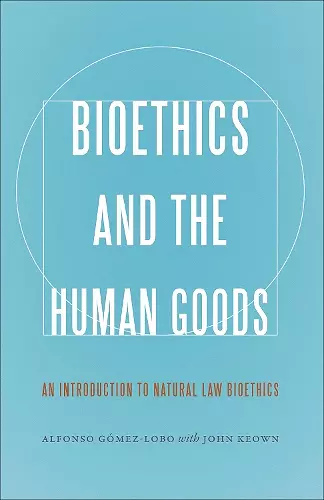Bioethics and the Human Goods
An Introduction to Natural Law Bioethics
John Keown author Alfonso Gomez-Lobo author
Format:Hardback
Publisher:Georgetown University Press
Published:15th Oct '15
Currently unavailable, our supplier has not provided us a restock date

Alfonso Gomez-Lobo was a thinker and writer of uncommon insight and wisdom. His death was a grievous loss not only for philosophy as an academic discipline, but for truth-seeking in the cause of sound public policy on morally charged issues in our public life. Praise to John Keown, therefore, for bringing us Professor Gomez-Lobo's Bioethics and the Human Goods. It will be a valuable resource in our efforts to shape law and public policy in line with central truths about right and wrong. -- Robert P. George, McCormick Professor of Jurisprudence, Princeton University Alfonso Gomez-Lobo was probably the best representative of natural law ethics that I have had the privilege of knowing. Bioethics and the Human Goods lays out the essential elements of this tradition before engaging a host of issues in bioethics, particularly around the beginning and end of human life. While disagreeing with much of the vision presented here, I cannot help admiring its moral seriousness, intelligence, and coherence. -- David DeGrazia, author of Human Identity and Bioethics and Creation Ethics: Reproduction, Genetics, and Quality of Life, George Washington University
Emphasising on human goods such as life, health, friendship, and knowledge and the wrongness of intentionally turning against them, the book provides a valuable approach to controversial bioethical questions at the beginning and end of life. Its approach contrasts with that of the dominant bioethical theories of utilitarianism and principlism.Bioethics and the Human Goods offers students and general readers a brief introduction to bioethics from a "natural law" philosophical perspective. This perspective, which traces its origins to classical antiquity, has profoundly shaped Western ethics and law and is enjoying an exciting renaissance. While compatible with much in the ethical thought of the great religions, it is grounded in reason, not religion. In contrast to the currently dominant bioethical theories of utilitarianism and principlism, the natural law approach offers an understanding of human flourishing grounded in basic human goods, including life, health, friendship, and knowledge, and in the wrongness of intentionally turning against, or neglecting, these goods. The book is divided into two sections: Foundations and Issues. Foundations sketches a natural law understanding of the important ethical principles of autonomy, non-maleficence, beneficence, and justice and explores different understandings of "personhood" and whether human embryos are persons. Issues applies a natural law perspective to some of the most controversial debates in contemporary bioethics at the beginning and end of life: research on human embryos, abortion, infanticide, euthanasia, the withdrawal of tube-feeding from patients in a "persistent vegetative state," and the definition of death. The text is completed by appendices featuring personal statements by Alfonso Gomez-Lobo on the status of the human embryo and on the definition and determination of death.
An impressive and welcome book . . . This book [is] dialectically engaged with an important and influential strand of contemporary bioethics. * American Journal of Bioethics *
This excellent book is an ideal read for the busy clinician. * Catholic Medical Quarterly *
The book is well written and offers a different, much-needed voice in contemporary bioethics discussions. . . . [The authors] have largely accomplished the task they set for themselves [and] have presented a solid introduction to bioethics through the lens of natural law theory. * The National Catholic Bioethics Quarterly *
The authors have strongly established credibility in the field and this specific topic. . . . This book meets its primary objective and can act as a great introductory resource for graduate students interested in bioethics because the philosophical arguments are assessable. When compared to other philosophical books in bioethics, this one is accessible to readers outside of mainstream philosophical bioethics and, therefore, an important contribution to the field. * Doody's Book Review *
- Runner-up for Catholic Press AssociationBook Award for Faith and Science 6 (United States)
- Runner-up for CPA Book Award for Faith and Science 6 (United States)
- Runner-up for Catholic Press AssociationBook Award for Faith and Science.
- Commended for Outstanding Title 6 (United States)
- Commended for Outstanding Title.
ISBN: 9781626162716
Dimensions: unknown
Weight: 340g
144 pages